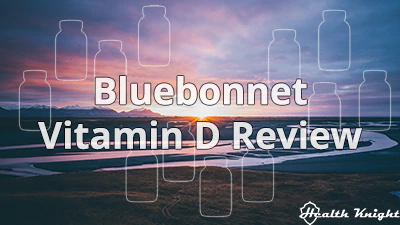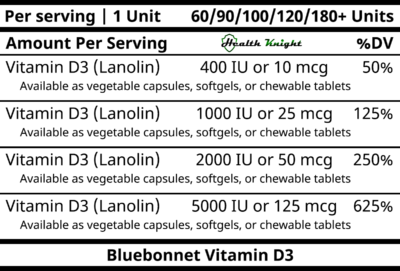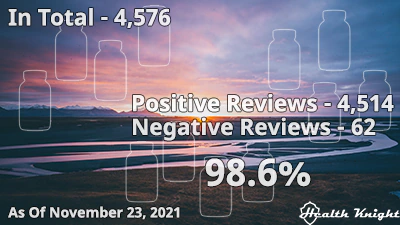| Marketing | Ingredients | Side Effects: Vegetable Capsules, Softgels, Chewable Tablets | Reviews | Pricing | Overall |
According to the Bluebonnet Vitamin D3 reviews, the supplement has been a huge success for the customers. Some praise the fact that it’s both vegetarian and vegan. Others are thrilled by the notion of high quality and Kosher. Whereas others are pleased with it being affordable as well. So, in this Bluebonnet Vitamin D3 review, we will explore all 12 vitamin D supplements by Bluebonnet thoroughly to find if they are really worth the money.
The idea is to first look at marketing and establish a sort of a baseline for what it is claimed to be. Then, it’ll be all about exploring ingredients, dissecting additives (side effects), researching customer reviews and success rates, and math-ing out pricing aspects.
Marketing | There Is Basically Nothing To Review Here
According to the manufacturer, the Bluebonnet Vitamin D3 is a “raspberry flavored, chewable tablet, sweetened with EarthSweet” kind of supplement that is all about bringing higher vitamin D levels to our health and well-being. But softgels and vegetable capsules are part of the equation, too [R, R, R, R].
 So, we’ve got 12 different supplements. Four different ones in the form of vegetable capsules, four – softgels, four – chewable tablets. Each has its own product page. All going by very similar looks.
So, we’ve got 12 different supplements. Four different ones in the form of vegetable capsules, four – softgels, four – chewable tablets. Each has its own product page. All going by very similar looks.
If we talk product pages, they’re arguably even simpler than that of the NOW Foods Vitamin D3 supplements (review). Namely, they’re very straightforward, brief, well-structured with no marketing whatsoever.
They don’t even bother to claim any benefits or otherwise really push on the notion of how more happy we’re going to be when we buy it (like what sales promotions typically aim for).
As for the Free-Of claims, all 12 Bluebonnet Vitamin D3s are typically promised to be Non-GMO, Kosher-Certified, Gluten-Free, Soy-Free, Dairy-Free, and Vegetarian-Friendly. The supplements are also typically promised to be Egg-Free, Wheat-Free, Peanuts-Free, Sugar-Free, Sodium-Free, Yeast-Free, Barley-Free, Shellfish-Free, and others.
So, all in all, they definitely look very decent. But are they really worth buying?
Ingredients | It’s All Vitamin D At Its Finest
While there are supplement brands that offer only one type of vitamin D supplement, many don’t go that road. In fact, much like such brands as NatureWise, Sports Research, and Nature Made, the Bluebonnet also offers different options as far as vitamin dosages.
So, per serving (one vegetable capsule, softgel, or chewable tablet), the supplements of this review offer either 400 IU (10 mcg), 1000 IU (25 mcg), 2000 IU (50 mcg), or 5000 IU (125 mcg) of vitamin D3. Here’s to elaborate on that.
 So, two things are most important when it comes to any vitamin D supplement. First, it’s about the vitamin D form that it offers. Second, it’s about the dosage and, to some extent, the flexibility with that as well.
So, two things are most important when it comes to any vitamin D supplement. First, it’s about the vitamin D form that it offers. Second, it’s about the dosage and, to some extent, the flexibility with that as well.
Furthermore, the remarkable difference in terms of beneficialness between vitamin D3 and D2 has also been recognized by a number of studies [R, R, R, R, R].
Second, different dosages for vitamin D are necessary because typically vitamin D levels vary greatly from person to person. And we need the kind of dosage best suited for us, specifically.
To illustrate, for a child, depending on the age 400 IU or 1000 IU is probably enough. For an adult whose vitamin D levels are within the healthy range, 2000 IU for maintenance is probably the best course of action. Whereas for someone deficient, depending on how mildly or severely deficient they are, 5000 or 10,000 IU is probably the ideal way [R, R, R, R, R].
Furthermore, for maintenance purposes, 2000 IU is what we should be having on top of what a multivitamin typically brings.
And so, this flexibility is really important. Otherwise, if we have just one dosage option (for example, just 5000 IU), it’s quite limited to who could be benefiting from it (for example, we won’t ever give a five-year-old child such an amount).
Hence, to that end, Bluebonnet vitamin D supplements have everything one could ask for.
The only other improvement I can think of is if these supplements were third-party tested. They aren’t. But as far as I can tell, their manufacturing is quality. And so, given also the fact that it’s just vitamin D, third-party testing doesn’t feel like a must.
Side Effects | Depending On The Delivery Options
Side effects are typically the product of the wrong kind of additives. Hence, it’s definitely useful to discuss what are the additives here, and whether or not they can affect our health poorly. To that end, the Bluebonnet Vitamin D3s have three different ways of doing it. We can get them in vegetable capsules (four supplements), softgels (four supplements), and chewable tablets (four supplements).
Since each of these options takes advantage of a different set of additives, we’ll look at each of them separately.
Bluebonnet Vitamin D3 Vegetable Capsules (Review) – Highly Unlikely To Cause Side Effects
For all four Bluebonnet Vitamin D3 vegetable capsule supplements, the additives are Kosher Vegetable Capsules, Vegetable Cellulose, and Vegetable Magnesium Stearate. Now, what does that mean?
Vegetable Cellulose is what plants are in large part made of. And hence, to that end, it’s naturally one of the most harmless additives possible. Period. So, having it is never a problem [R, R, R, R, R].
 The same can be said about Magnesium Stearate. Yes, most of the internet has coined this as a harmful addition. But that is not the case if we dive deep into the available research. Quite the contrary, the studies actually imply that there are no dangers for humans when it comes to this substance [R, R, R, R, R].
The same can be said about Magnesium Stearate. Yes, most of the internet has coined this as a harmful addition. But that is not the case if we dive deep into the available research. Quite the contrary, the studies actually imply that there are no dangers for humans when it comes to this substance [R, R, R, R, R].
And that’s something even further emphasized by the fact that babies consume a bunch of it (the constituent of the Magnesium Stearate blamed for all the ill effects) through mother’s milk. And we can never consume that much [R].
Lastly, Kosher Vegetable Capsules are a bit tricky. You see, it’s not actually an ingredient. Just like a Natural Flavor, it’s an ingredient that hides other ingredients underneath it. Still, I don’t think it is a problematic one.
I mean, from what I gather, it is very likely that the underlying ingredients are either various types of Cellulose (which is absolutely fine) or Cellulose in combination with pure Glycerin (which is also fine). That said, I would still prefer the Bluebonnet Vitamin D3 Vegetable Capsules to specify in, say, brackets what the actual ingredients of the Kosher Vegetable Capsules are [R, R, R, R, R].
All in all, the Vegetable Capsules are highly, highly unlikely to bring any side effects whatsoever.
Bluebonnet Vitamin D3 Softgels (Review) – There’s Some Good & There’s Some Bad
One rather unique difference that the Bluebonnet Vitamin D3 Softgels offer is that vitamin D3 is derived from Fish Liver Oil instead of Lanolin. As far as beneficialness, there won’t be a difference but there are people who’d much rather prefer the Fish Liver Oil way as they consider it “more natural” than the other.
But this “more natural” way does come at the cost of worse additives. So, for the making of softgels, Bluebonnet uses Gelatin, Safflower Oil, Glycerin, and Purified Water.
 Gelatin is typically a very helpful and beneficial additive. I mean, some even go as far as to say that even vegans should consume given how helpful for our bodies it is. The only slight downside is that it sometimes causes bad breath or a bad taste in the mouth [R, R, R, R, R, R, R, R].
Gelatin is typically a very helpful and beneficial additive. I mean, some even go as far as to say that even vegans should consume given how helpful for our bodies it is. The only slight downside is that it sometimes causes bad breath or a bad taste in the mouth [R, R, R, R, R, R, R, R].
Another thing to consider is the Kosher aspects or Gelatin sourcing. One of the dosage versions claims to be Kosher-Certified (the 2000 IU one), hence it’s likely that they’ve used bovine Gelatin for that. Whereas others don’t hold that claim (400 IU, 1000 IU, and 5000 IU), hence it’s likely Gelatin from a pig. I would certainly prefer the former.
Glycerin is, generally speaking, a very harmless additive. So is also water. But Safflower Oil is a bit of a different story [R, R, R, R, R, R].
Yes, Safflower Oil can be beneficial, for example, by reducing cholesterol levels and heart disease risk. But it’s also a vegetable oil. And being one means that it’s highly processed and it likely brings high amounts of Omega-6 Fatty Acids which typically people already have too much of in their diets. And that can not only thin the blood, but also work as a toxin for the brain (which is a bad thing) and just promote inflammation in general [R, R, R, R, R, R, R].
The bottom line, there are so many better oil choices if we need one. And to that end, the Safflower Oil feels like a lazy one.
Bluebonnet Vitamin D3 Chewable Tablets (Review) – Their Unique Approach To The Vitamin
The Bluebonnet Vitamin D3 Chewable Tablets are a kind of Bluebonnet’s trade thing, something unique to Bluebonnet. I mean, many other brands out there offer vitamin D supplements in either vegetable capsules or softgels. But none of them do it quite like Bluebonnet with their Chewable Tablets. And even when other manufacturers do attempt chewable tablets, they either over sugar them or over-artificial-sweeteners them. Neither of which is good or viable.
Moreover, Bluebonnet doesn’t really do that. But to manage that task, they do have quite a few additives.
 So, for the making of Chewable Tablets, the supplements of this review use Natural Raspberry Flavor, Natural Strawberry Flavor, EarthSweet (juice concentrates (wild blueberry, cranberry, prune, cherry, strawberry, grape, raspberry and bilberry fruits, grape seed and raspberry seed extracts), cane crystals), Vegetable Magnesium Stearate, Stearic Acid, and Vegetable Cellulose.
So, for the making of Chewable Tablets, the supplements of this review use Natural Raspberry Flavor, Natural Strawberry Flavor, EarthSweet (juice concentrates (wild blueberry, cranberry, prune, cherry, strawberry, grape, raspberry and bilberry fruits, grape seed and raspberry seed extracts), cane crystals), Vegetable Magnesium Stearate, Stearic Acid, and Vegetable Cellulose.
Generally speaking, all Natural Flavors can be tricky. The thing with them is that the term “Natural” doesn’t guarantee that they are a healthy thing. The deciding aspect in that is much rather what manufacturing practices any given manufacturer subscribes to. And as far as Bluebonnet’s go, I believe they have it quality [R, R, R, R, R].
Hence, the Natural Raspberry and Natural Strawberry Flavors are likely very fine in the Bluebonnet Vitamin D3 Chewable Tablets.
As for the BlueSweet, it doesn’t use either highly harmful sugar forms or artificial sweeteners. Primarily, it’s all a mix of various juice concentrates, fruit extracts, and seed extracts. Secondary, there’s also some sugar there hiding under the term “cane crystals.” Not a fan of that secondary ingredient but it’s way better than what tasty supplements typically go for [R, R, R, R, R, R, R].
Furthermore, given how far along in the ingredient list it’s located, it’s safe to say that there are very minor amounts of it (regulations say that ingredients must be listed in the order starting with the most predominant one). Which is good [R].
Whereas Vegetable Magnesium Stearate and Vegetable Cellulose we already discussed in the previous sections. And Stearic Acid is just a constituent within Magnesium Stearate blamed for all the bad effects of the latter (which, again, are rubbish and just not true if we thoroughly research the available studies) [R, R, R, R, R].
Thus, all in all, Bluebonnet Vitamin D3 Chewable Tablets are very unlikely to bring any side effects.
Reviews | A Picture Of Being Very, Very Capable
Many product pages nowadays take advantage of customer review sections. They’re very common. The reason being is that they help to sell the products better since they pretty much work as and are perceived as the word of mouth. And manufacturers are very interested to sell.
Still, the Vitamin D supplements of this review don’t have such a section. Hence, it’s all in the hands of third-party sellers and retailers.
In total, I managed to find 4,576 unique Bluebonnet Vitamin D3 reviews. Of these, between the categories of Vegetable Capsules, Softgels, and Chewable Tablets a good deal was overlapping. For example, some 3000 pieces of customer feedback showed up as both reviews for the Vegetable Capsules and Softgels.
 Hence, the math might get a bit confusing from here. But bear with me. I’ll try to break it down as easy to understand as possible.
Hence, the math might get a bit confusing from here. But bear with me. I’ll try to break it down as easy to understand as possible.
So, when it comes to Bluebonnet Vitamin D3 Vegetable Capsules reviews, I came across a total of 3,601 ratings. Of these, 3,565 were positive whereas just 36 were negative. In terms of success rate, that’s 99.0%. Which is very good.
Then, we have Bluebonnet Vitamin D3 Softgels reviews. For these, I managed to find in total 3,470 pieces of feedback. Here, 3,440 were positive and 30 were negative. To do the math, that’s a 99.1% global success rate. Which is the highest one of the entire brand.
Lastly, we’ve got 905 Bluebonnet Vitamin D3 Chewable Tablets reviews. Of these, 24 were negative when 881 were positive. In terms of success, that’s 97.3%. Which is still a really high percentage.
So, these are the success rates divided among all the various types of dosage forms (vegetable capsules, softgels, chewable tablets). But what about across the entire brand?
Well, as mentioned, a good deal of the feedback overlaps. In total, we’re left with 4,576 unique Bluebonnet Vitamin D reviews. Within these, we’ve got 4,514 good and 62 bad. This means that the success rate is 98.6%.
Granted, it’s not as high as what I’ve seen by some other vitamin D supplements. But that’s irrelevant because it’s still an obnoxiously high one. One thing is, for sure, the ingredients are good, and hence, the success rates have way more weight (unlike it would be if the ingredients were inherently bad). The brand definitely works.
Pricing | They Say Bluebonnet Is Affordable But Is It Really?
I think that another very worthy aspect to consider is pricing. Because we would never care that any given supplement is marvelous if it cost a ton of money; namely, if it was priced unreasonably. Judging by the Bluebonnet Vitamin D3 reviews, it’s way more likely that the supplements are affordable but is that also evident in the numbers?
For these products, pricing is a bit difficult to pinpoint since it depends highly on two aspects.
 First, it depends on how much IU (amount) we’ve got per capsule, softgel, or chewable tablet. And second, it depends on whether it’s a capsule (most expensive with 400 IU and 1000 IU), a softgel (cheapest), or a chewable tablet (most expensive with 2000 IU and 5000 IU). But since 2000 IU is likely what most people will go for, we’ll focus on that.
First, it depends on how much IU (amount) we’ve got per capsule, softgel, or chewable tablet. And second, it depends on whether it’s a capsule (most expensive with 400 IU and 1000 IU), a softgel (cheapest), or a chewable tablet (most expensive with 2000 IU and 5000 IU). But since 2000 IU is likely what most people will go for, we’ll focus on that.
So, per container, the vegetable capsules option (90 servings) typically costs $10.80. The softgel version (100 servings) prices typically at $9.95. And the chewable tablets (90 servings) typically come for $11.96. Meaning, that’s 12.0 cents, 10.0 cents, and 13.3 cents for every 2000 IU of vitamin D3, respectively.
So, how does that compare?
If we compare it to something like the Sports Research Vitamin D3, it does quite unfavorably. I mean, not only does Sports Research cost 4.7 cents for every 2000 IU softgel (on average, 2.5 times lower price), but also it is third-party tested for purity, potency, and safety. But Sports Research doesn’t carry a Kosher certification.
If we compare it to something like the Doctor’s Best Vitamin D3 options, the same story, again. Meaning, Doctor’s Best costs typically 3.3 cents for every 2000 IU softgel (on average 3.5 times lower price). No Kosher certification or third-party testing, though.
And there are many other examples but the bottom line I believe is that Bluebonnet is not that cheap at all.
Overall | Generally, I Think This Is A Really Good Brand To Invest In
I think that Bluebonnet is definitely one of the good brands when it comes to vitamin D. It’s got a lot to show for and the flaws that it does have are rather minor.
 So, for negatives, we certainly have pricing. It’s just considerably more expensive than other viable options out there. And another one, a rather slight one is maybe the fact that it’s not third-party tested.
So, for negatives, we certainly have pricing. It’s just considerably more expensive than other viable options out there. And another one, a rather slight one is maybe the fact that it’s not third-party tested.
Whereas for positives, we have flexibility (dosage per unit for all needs and of all types) and the beneficial ingredients to go for (vitamin D3). We have success rates that are bonkers high. And, of course, the choice of additives is typically pure. Meaning, with most, side effects are extremely unlikely, to say the least.
Hence, (out of avoid it, consider it, shortlist it, buy it) I would on average rank Bluebonnet Vitamin D3 as a shortlist-able one. Namely, to divide it up for each of the categories, I would shortlist Vegetable Capsules, consider Softgels, but buy Chewable Tablets. Or to sum it up, I think if we want our vitamin D to be tasty, Bluebonnet absolutely excels at that.
Whereas if cost-efficiency and reaching optimal vitamin D levels is all you care about, I would pick this one (full review). It’s also my favorite, one that I use daily and have successfully improved my vitamin D levels with (blood tests to approve).
Other than that, I hope this Bluebonnet Vitamin D3 review helped you find the information you were looking for. What did you find the most interesting about the brand? Was there an aspect that absolutely surprised you? Let me know your thoughts below. And do feel free to leave your own personal reviews on the products as well.
Thanks for your review on Bluebonnet vitamin D supplements. Supplements are tricky, because it’s hard to know what dosage. It was great you provided some insight into that in your article. It’s good to see that this company has dosage options.
I took a DNA test and found out I don’t absorb vitamin D without an enzyme added. I didn’t see that enzyme in the ingredient list, but it looks like a great product for most people. My condition is rare, so most folks don’t have to be concerned.
Your review was very thorough, and I look forward to more reviews from you.
I do think it’s beneficial for folks to get a DNA test to see what nutrients they may have trouble absorbing. It may be worth studying for you. I’m happy to share my info on it if you ask.
Keep up the good work!
Al
Hey, Al!
That’s really interesting. I had no idea there was such a condition that would hinder vitamin D3 absorption. But it does make sense that there could be. I will have to look more into it personally as well. And, for sure, if you do get a chance, I would love any info you can share or point me to.
I really appreciate the kind words; it means a lot. :)
Cheers,
Matiss
Hi Matiss,
I have not heard of the Bluebonnet vitamin D3 supplement before now. However, it looks like a great product because of its natural ingredients and components.
Another interesting thing is that it’s chewable because I don’t enjoy taking supplements in tablet form. They always give a kind of scare.
Though it’s on the high side, I wouldn’t mind buying it because it’s highly rated, and the value it offers is awesome.
But is it okay for kids to take the supplement as well?
Hey, Muslimah!
Yeah, I totally get that. And, for sure, if that’s your preferred way of consuming supplements, definitely go for it.
Yeah, it’s definitely great for kids as well. Great ingredients, tasty, and everything. :)
Cheers,
Matiss
I noticed at the end you suggested Now Foods Vitamin D3. I have used Now Foods products before and highly rate them if supplementation is ever needed. In terms of vitamin D, it often is, because of the lack of adequate sunlight in many locations.
I always avoid anything with vegetable oil in it such as sunflower oil and safflower oil, however, I am willing to take something with olive oil in if necessary, and I like that the Now Foods option uses extra virgin olive oil.
Hey, Clair!
Yeah, I absolutely feel you. It’s a genuinely great brand.
Indeed, I think that’s the best way how to go about it. :)
Cheers,
Matiss
Matiss, Thank you for your review on these vitamins! As a resident of the cold sunless in winter midwest, we have to consume a fair amount of D3! I never realized there was a chewable form of this vitamin. Due to having stomach surgery I am supposed to consume chewable vitamins because they absorb better into my system! When we run out of our current supply I will have to give these a try, I bookmarked the site!
Hey, there!
Yeah, cold and sunless winders are the worst when it comes to getting some of that vitamin D3 through sunlight.
If you ever get a chance, do let me know how it goes. I’d love to hear from you. :)
Cheers,
Matiss
Hi, Matiss! Thank you for this detailed article and thoughtful review of Bluebonnet’s Vitamin D3 supplements. As a blogger in the health space, I am always interested in learning about new products on the market and the quality of their ingredients. It sounds like Bluebonnet’s vitamin D3 is a high-quality supplement based on your review. I’ll share this with my patients!
Hey, Erica!
Yeah, for sure, Bluebonnet gets, essentially, everything right most of the time as a whole. But I really like those chewable tablets. To that end, they pretty much have no rival.
Thank you! That’s awesome to hear! If you ever have any insights you feel like sharing, I’m all ears. :)
Cheers, Erica!
Matiss